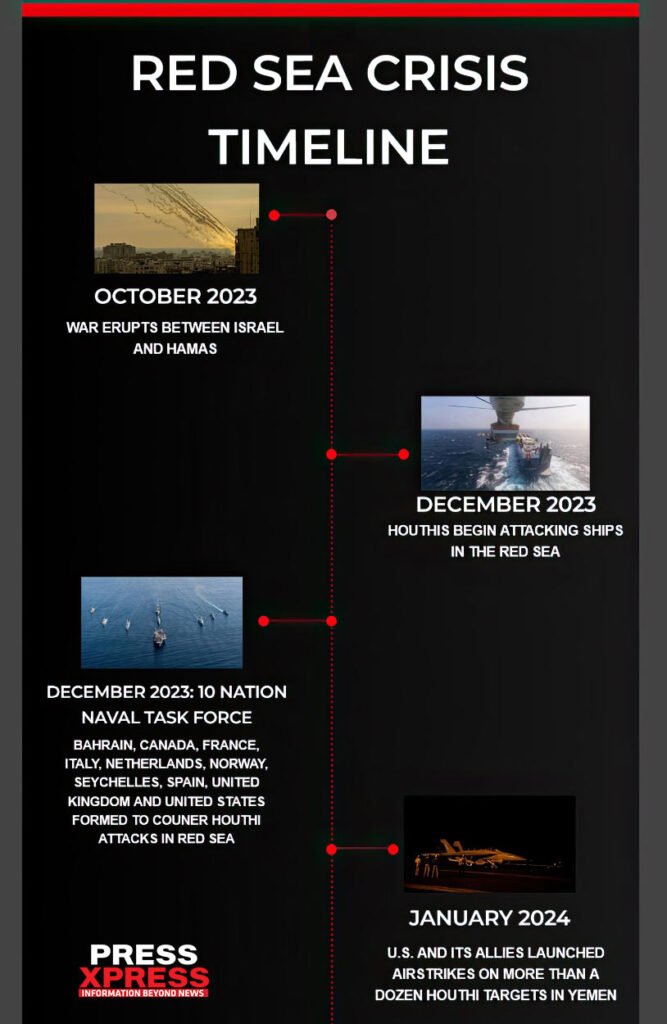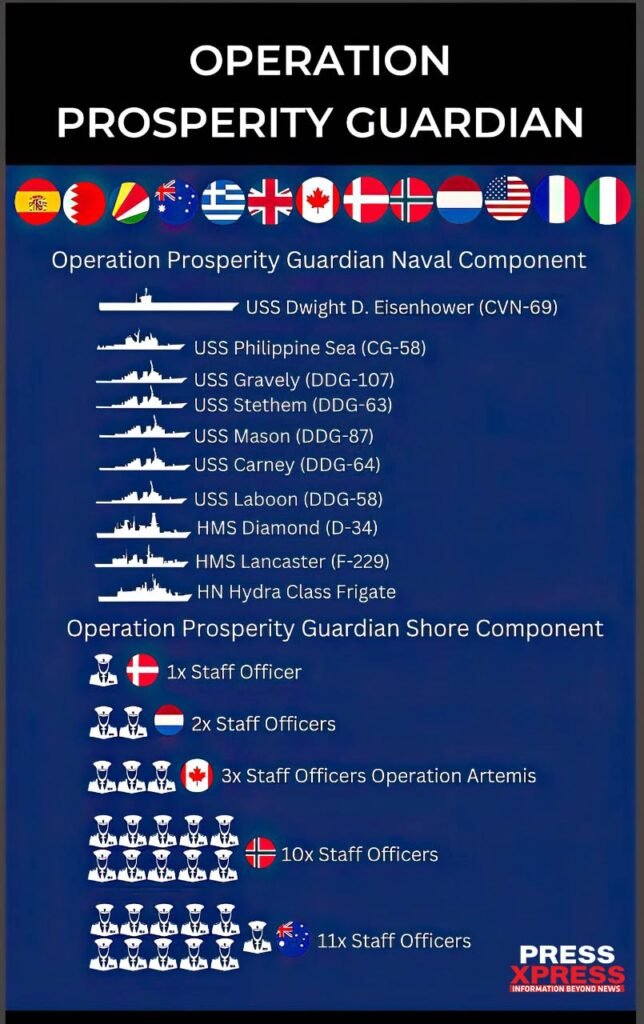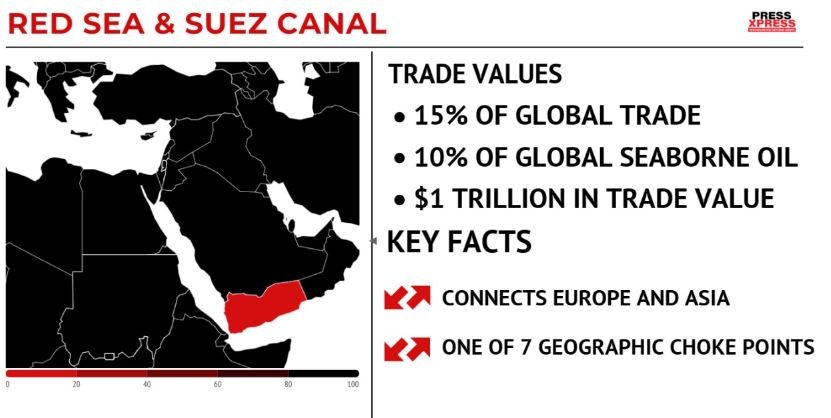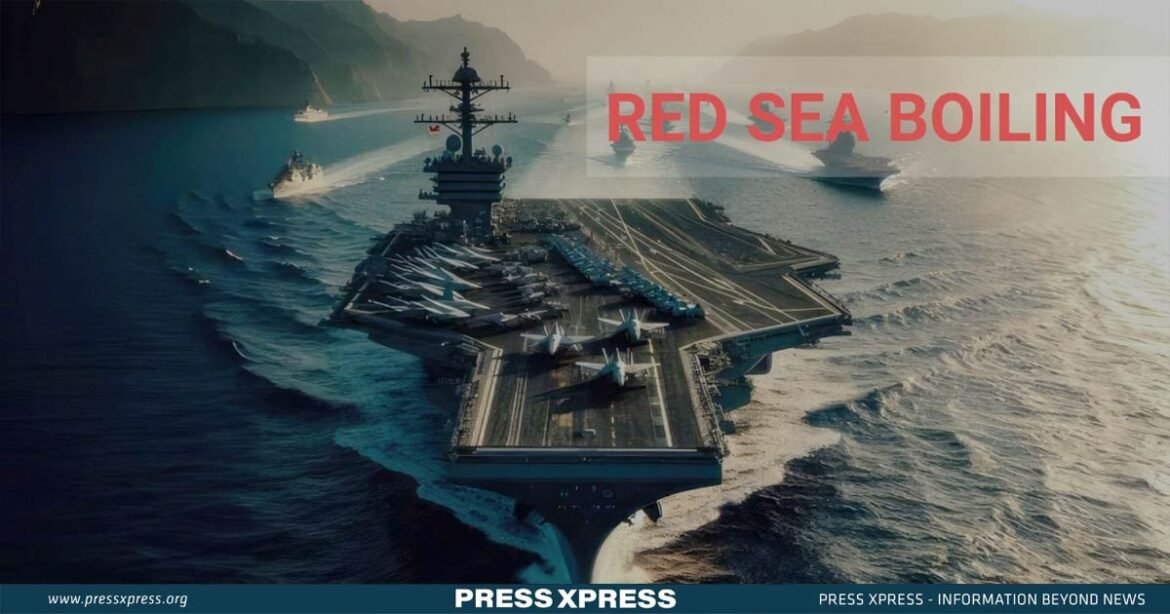The Red Sea, a vital waterway for global trade and regional security, has become a hotspot of conflict and tension in recent months. The main source of instability is the Iran-backed Houthi movement, which controls the western coast of Yemen, as they have been launching attacks on commercial vessels that have direct or indirect affiliation with Israel and military targets of Israel and Western nations in the Red Sea. The Houthis have stated that these attacks are specifically in retaliation for Israel’s brutal attack and bombing of the Gaza Strip.
The US and the UK, along with other allies, have responded with air strikes and naval patrols to protect the freedom of navigation and deter further aggression. However, the situation remains volatile and complex, as other Middle Eastern powers have their own interests and agendas in the region. What are the causes and consequences of the Red Sea crisis, and what are the prospects for peace and cooperation?
Background: Houthi Blockade and Attacks

The Houthi movement, formally known as Ansar Allah, is a rebel group that champions Yemen’s Shia Muslim minority, the Zaidis. The Houthis have been using their control of the Red Sea coast to block and attack the movement of commercial ships, especially those carrying oil and gas. They have also targeted military vessels and bases of the Saudi-led coalition and its allies, such as Egypt, Sudan, and the United Arab Emirates.
US and UK involvement: Operation Prosperity Guardian
The US and the UK, along with other Western and regional partners, have been alarmed by the Houthi attacks and their implications for the security and stability of the Red Sea and the broader Middle East. In January 2024, the US and the UK launched Operation Prosperity Guardian, a joint military campaign to counter the Houthi threat and protect the freedom of navigation in the Red Sea.

Role of Other Middle Eastern Powers: Competition and Cooperation
The Red Sea crisis has also drawn the attention and involvement of other Middle Eastern powers, who have their own interests and rivalries in the region. Some of them have aligned themselves with the US and the UK, while others have taken a more neutral or independent stance.
Egypt, which controls the Suez Canal, the northern gateway to the Red Sea, has been a key ally of the US and the UK in the operation. Egypt has a strategic interest in maintaining the security and stability of the Red Sea, as it relies on the canal for its economic and military lifeline.
Saudi Arabia, the leader of the coalition against the Houthis in Yemen, has also supported the US and the UK in the operation. Saudi Arabia has a vital interest in securing the Red Sea, as it exports most of its oil and gas through the waterway.
Israel, which has been the main target of the Houthi attacks, has also welcomed and participated in the operation. Israel has a strategic interest in safeguarding the Red Sea, as it imports most of its goods and energy through the waterway.
Turkey, which has been expanding its influence and presence in the region, has taken a more ambivalent and nuanced position on the operation. Turkey has also been involved in a regional competition with Saudi Arabia and Egypt, which it views as rivals and adversaries. Turkey has maintained a naval base in Somalia and has established close ties with Sudan and Qatar, which are sympathetic to the Houthis and Iran. Turkey has called for a peaceful and diplomatic resolution of the crisis and has offered to mediate between the parties.
Consequences of the Current Situation: Risks and opportunities
The Red Sea crisis has had significant consequences for the region and the world, both in terms of security and economy. The crisis has also created some risks and opportunities for peace and cooperation.
On the security front, the crisis has increased the level of violence and instability in the region and has raised the possibility of a wider and more dangerous escalation. The Houthi attacks have posed a serious threat to the safety and security of the ships and crews that traverse the Red Sea and have endangered the lives and livelihoods of millions of people who depend on the waterway for trade and transportation. The US and UK strikes have also caused collateral damage and civilian casualties, and have inflamed the sentiments and grievances of the Houthi supporters and sympathizers.
On the economic front, the crisis has disrupted the global supply chain and trade and has affected the prices and availability of goods and commodities. The Red Sea is one of the most important and busiest maritime routes in the world, carrying about 10 to 15 percent of the world’s trade, including oil, gas, food, and manufactured products.
The crisis has also provided an impetus and momentum for the peace process in Yemen, which has made some progress in recent months, with the Houthis and the Hadi government agreeing to a nationwide ceasefire and a set of confidence-building measures. The crisis has also opened some channels of communication and diplomacy among the regional and international powers, especially between the US and Iran, which have resumed indirect talks on the nuclear deal and other issues.

Future e Scenarios: War or Peace?
The Red Sea crisis is likely to continue and evolve in the near future, depending on the actions and reactions of the parties and stakeholders. The crisis could either de-escalate and stabilize, or escalate and destabilize, with different scenarios and implications for the region and the world.
One possible scenario is that the crisis could de-escalate and stabilize if the parties and stakeholders manage to contain and resolve the conflict through dialogue and diplomacy. This scenario could be facilitated by several factors, such as:
- The Houthis could stop their attacks on the Red Sea, and comply with the UN-led peace process in Yemen, in exchange for some concessions and guarantees.
- The US and the UK could scale back their military operations, and engage in direct or indirect talks with the Houthis and Iran.
- The regional powers, such as Egypt, Saudi Arabia, Israel, and Turkey, could coordinate and cooperate with each other, and with the US and the UK, to establish a framework and mechanism for the security and stability of the Red Sea.
This scenario could have positive implications for the region and the world, such as:
- The security and stability of the Red Sea, and the safety and freedom of navigation, would be restored.
- The humanitarian and economic situation in Yemen would improve, creating the conditions for a lasting and inclusive peace and reconciliation.
Another possible scenario is that the crisis could escalate and destabilize if the parties and stakeholders fail to contain and resolve the conflict through dialogue and diplomacy. This scenario could be triggered by several factors, such as:
- The Houthis could continue and intensify their attacks on the Red Sea, and expand their targets and tactics, to inflict more damage and disruption, and to gain more leverage and recognition.
- The US and the UK could increase and broaden their military operations and target not only the Houthis but also Iran and its proxies and allies.
- Iran could escalate its support for the Houthis, and retaliate against the US and the UK, and their allies and interests.
This scenario could have negative implications for the region and the world, such as:
- The security and stability of the Red Sea, and the safety and freedom of navigation, would be threatened and disrupted.
- The humanitarian and economic situation in Yemen would worsen.
- The Regional and international relations would deteriorate, increasing the hostility and mistrust.
Conclusion: The Need for Peace and Cooperation
The Red Sea crisis is a complex and multifaceted issue. The crisis also offers an opportunity and incentive for dialogue and cooperation among the parties and stakeholders, to restore and maintain the security and stability of the Red Sea, and to support the peace and development of Yemen, and the region. The crisis requires a collective and coordinated response, based on mutual respect and understanding, and on common interests and values, to achieve a peaceful and prosperous future for all.


